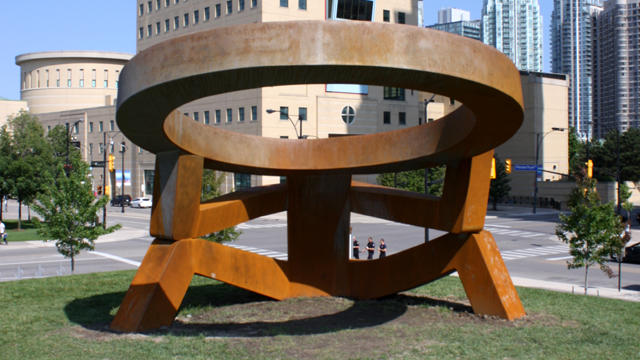Mississauga is Working Towards Building a More Arts-Friendly City
Published December 5, 2017 at 6:02 am

The City of Mississauga has been working on a city wide culture strategy and they recently held a public meeting to present the feedback they received from previous meetings with stakeholders, artists and other interested parties.
The presentation was based from this online survey soliciting feedback from residents who went on the site, as well as those who attended the public meeting and provided their feedback on the display boards.
In their presentation, the city identified five strategic priorities in developing its Cultural Master Plan:
-
Priority 1: Build an arts-friendly city
-
Priority 2: Enhancing and improving cultural spaces and places
-
Priority 3: Expanding and growing leadership in the cultural sector
-
Priority 4: Authentic Cultural Identity that is welcoming, inspiring and enriching
-
Priority 5: Sharing our story beyond Mississauga’s borders
Also in attendance was Paul Damaso, the director of the city’s Cultural Division, Natalie Lue, the CEO of the Living Arts Centre, and other residents with one person identifying herself as a local artist.
Within the parameters of those five priorities, city staff presented specific recommendations for feedback. The following is a sampling of those specifics under each category:
Building an Arts Friendly City
-
Increase funding for culture grants over the next six years.
-
Implement an artist residency program, including an arts incubation and technical theatre training program.
-
Partner with galleries and museums to bring significant exhibitions to Mississauga.
-
Collaborate with artists, organizations and partners to grow digital based arts programming.
-
Celebration Square will strive to be a leader in best practices for digital public art.
-
Commission digital art projects that use new and emerging technology.
-
Develop a thematic heritage project that tells Mississauga’s stories inclusive of all narratives, past and present.
-
Develop a strategy for the acquisition of new Corporate Art.
-
Create an archaeological master plan.
-
Update heritage planning processes with all relevant governmental policies and industry standards.
-
Review the Culture Grant program every four years starting in 2020.
Enhancing and improving cultural spaces and places
-
Identify Cultural Districts, which will be unique areas across the city with a high concentration of cultural facilities and activities.
-
Work in collaboration with other city departments to improve City spaces in or near Cultural Districts to support cultural activity.
-
Coordinate City programming within Cultural Districts.
-
Encourage the development of creative industries in Cultural Districts.
-
Encourage arts groups and private space owners to develop partnerships for programming and after-hours use of facilities for cultural use.
-
Encourage private space owners to incorporate temporary and long-term creative spaces into new developments.
Expanding and growing leadership in the cultural sector
-
Identify alternative funding tools and sources to support cultural development.
-
Create a “percentage for public art” policy for City-owned projects.
-
Create a formal network with post-secondary institutions to share best practices.
-
Expand the City’s Financial Assistance Program (Active Assist) to include admission to paid arts performances in City-operated facilities.
-
Promote and showcase non-traditional art forms.
-
Increase opportunities to showcase and highlight local creatives, focusing on groups traditionally under-represented.
-
Have a public art program that is diverse and accessible to all ages, abilities, ethnic groups and socio-economic backgrounds.
Supporting an Authentic Cultural Identity that is welcoming, inspiring and enriching
-
Support projects that acknowledge and interpret Mississauga’s heritage, Indigenous history, cultural diversity and intersectionality.
-
Improve information sharing about local history, lived heritage and cultural attributes within neighbourhoods.
-
Expand resident and visitor experiences through placemaking and culture in the public realm.
-
Expand the work of the museums beyond their current location.
Sharing Mississauga’s story beyond its borders
-
Raise Mississauga’s profile through events, major initiatives and premium cultural experiences at Celebration Square, Meadowvale Theatre, Small Arms Building and the Museums of Mississauga.
-
Support groups to grow and develop signature events and initiatives that draw attention beyond our borders.
-
Align cultural efforts with Mississauga’s Tourism Master Plan.
-
Increase public awareness of Mississauga and highlight the creative scene in Mississauga.
-
Proactively promote Mississauga as a cultural destination and festival site for cultural producers.
The idea about having Cultural Districts is borrowed from other cities, and many consider libraries and community centres in the realm of being such districts. But a few residents opined that cultural districts do not have to be restrained within the confines of city operated areas. They just need to be where people are gathering, such a mall. For example, Erin Mills Town Centre recently played host to events sponsoring public art within their walls.
One common observation was the lack of coordination amongst various interested parties to promote the arts in a coherent campaign across Mississauga. Networking is interdisciplinary; arts and culture may be an end goal, but incorporating it with other elements of society and the economy is also important to ensuring that that sector can be successful.
A representative from the Mississauga Board of Trade also opined that the city has become a net importer of jobs; more people are commuting to Mississauga to work than going to work in Toronto. How do you keep those people from leaving after the 9-5 shift is finished, instead having them stay for some kind of cultural experience? But it was heartening to hear one person say that they had co-workers who live in downtown Toronto, but came to Mississauga on the weekend during a festival.
Here are some of the answers residents provided on the display boards at the public meeting:
These are just some of the comments people left at the meeting, and there is still time to enter your comments on the previously referenced online survey.
What do you think Mississauga should do to enhance cultural activities, events, and promotion?
Follow me on Twitter @thekantastic
INsauga's Editorial Standards and Policies


